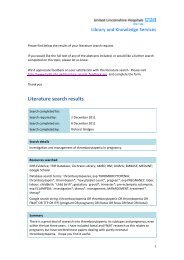Qualitative research terms
Qualitative research terms
Qualitative research terms
Create successful ePaper yourself
Turn your PDF publications into a flip-book with our unique Google optimized e-Paper software.
Inductive analysis is a form of analysis based on inductive reasoning; a <strong>research</strong>er using<br />
inductive analysis starts with answers, but forms questions throughout the <strong>research</strong> process.<br />
Interviews are one of the main means of conducting qualitative <strong>research</strong>. Interviews are<br />
usually:<br />
• Focus groups - interviews of groups of people with something in common.<br />
• Semi-structured – follow a topic guide but allows for follow-up of points<br />
• Unstructured – aims to discuss a limited number of topics in great depth – no<br />
structure or pre-conceived plan.<br />
Iteration relates to the process of repeatedly returning to the source of the data to ensure<br />
that the understandings are truly coming out of the data. In practice this means a constant<br />
process of collecting data, carrying out a preliminary analysis, and using that to guide the<br />
next piece of data collection and continuing this patterns until the data collection is complete.<br />
Phenomenology seeks to describes or explains phenomena.<br />
Reflexivity is the open acknowledgement by the <strong>research</strong>er of the central role they play in<br />
the <strong>research</strong> process. A reflexive approach considers and makes explicit the effect the<br />
<strong>research</strong>er may have had on the <strong>research</strong> findings.<br />
Respondent validation refers to seeking the participants' views of the initial interpretations<br />
of the data. The aim is to ensure that the participants and the <strong>research</strong>er are in agreement<br />
as to the meaning of the data, but that the <strong>research</strong>er has the opportunity to incorporate the<br />
participants' responses into the analysis.<br />
Rigour is the degree to which <strong>research</strong> methods are scrupulously and meticulously carried<br />
out in order to recognize important influences occurring in a experiment.<br />
Sampling is the process of selecting participants to take part in the <strong>research</strong> on the basis<br />
that they can provide detailed information that is relevant to the enquiry.<br />
Purposive sampling is the selection of participants who have knowledge or experience of<br />
the area being investigated. Types of purposive sampling include:<br />
• Typical – case chosen because thought to be like the majority<br />
• Maximum variation – identify the diverse characteristics of the population and<br />
then sample people that match these characteristics<br />
• Snowball – ask people who else might be usefully interviewed.<br />
• Theoretical sampling is one in which the objective of developing a theory or<br />
explanation guides the process of sampling and data collection.<br />
• Convenience sampling – the cases that can be studies most easily, cheaply or<br />
quickly, but it is the least credible.<br />
Thematic analysis – see content analysis<br />
Transferability is the ability to apply the results of <strong>research</strong> in one context to another<br />
similar context. Also, the extent to which a study invites readers to make connections<br />
between elements of the study and their own experiences.<br />
Triangulation is the process by which the area under investigation is looked at from<br />
different perspectives. These can include two or more methods, sample groups or<br />
investigators. Used to ensure that the understanding of an area is as complete as possible<br />
or to confirm interpretation through the comparison of different data sources.<br />
Validity asks whether the interpretation placed on the data accords with common sense and<br />
is relatively untainted with personal or cultural perspective. (see also credibility)
















